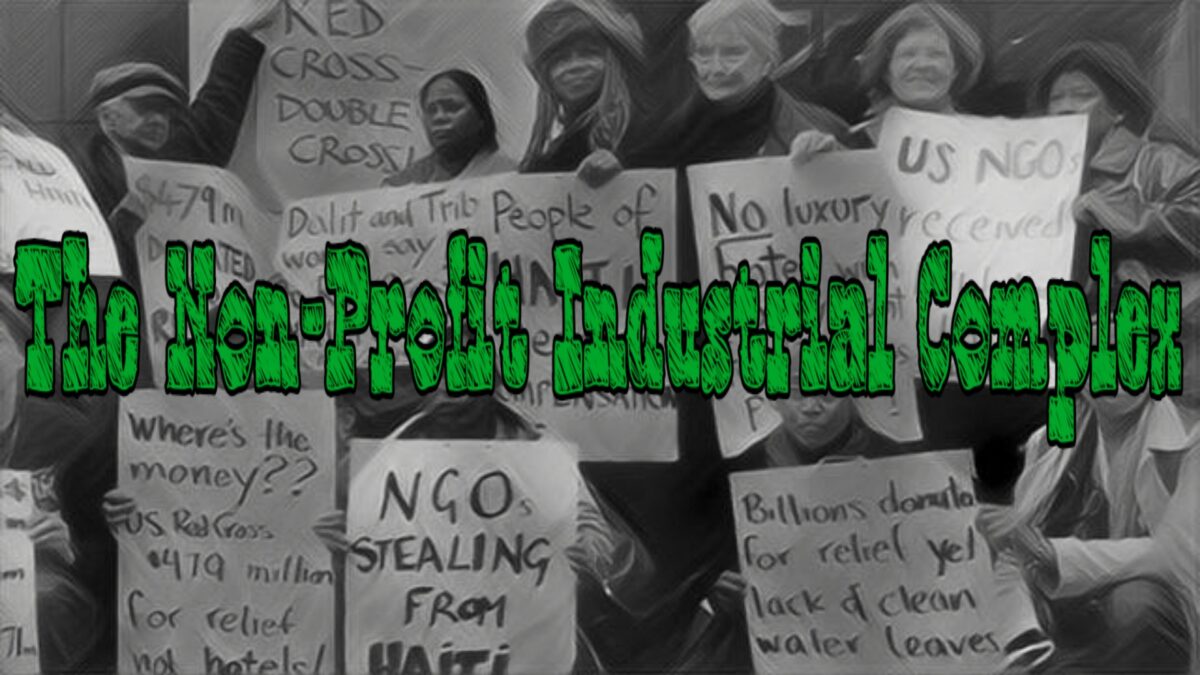We conducted this interview with a group who are ‘exposing the truth of the non-profit industrial complex, the consulting industry, media, unions, politicians and entitled progressives’.
Non-profits, NGOs, social enterprises and foundations have been performing an aggressive hostile takeover of radical campaigns for decades. They are one of the largest industries in the world and one of our greatest barriers to changing the world for the better.
Analysis like this is much needed if we are to take back control of our own movements.
1. What exactly is the nonprofit industrial complex?
Well, there are a couple of ways to define it but the organization INCITE may have the best definition which is “a system of relationships between the State, the owning classes, foundations, and nonprofit/NGO social service and social justice organizations that results in the surveillance, control, derailment, and everyday management of political movements.” Unfortunately, this may be a very wordy and complicated definition so maybe a more concise way to define it would be that it is a concept to describe the nonprofit sector and the way it works with other systems like our government and the wealthy to push a certain agenda, which is often to maintain the status quo.
2. Why should grassroots organizers be wary of the nonprofit sector?
The nonprofit sector often serves as an impediment to progress and is a barrier to organizers with more radical agendas. For example, nonprofits will often be accuse of co-opting grassroots movements. This will often mean many of the goals that originated with grassroots organizers will become watered-down. To make matters worse, nonprofits are often heavily funded and have the connections needed to receive media attention. Hence, the grassroots groups are stuck in this impossible position. They are not only trying to fight an injustice the state is implementing but are now competing against the nonprofit sector for resources. And if someone wants to volunteer or donate to some organization, chances are they will likely donate to the one they have heard of which means rich nonprofits only get richer. In addition, because these nonprofits rely heavily on funding from wealthy individuals, corporations, and/or government, their goals are understandably questioned. It also helps explain why the agenda they often push is much less radical than the one being pushed by grassroots organizers. For example, we saw this recently in NYC where grassroots organizers were fighting for the defunding and abolition of the police. Major nonprofits that had ties to elected officials upstaged these groups by demanding for a 1 billion dollars reduction in the NYPD budget. This may sound like a lot but it’s not when you consider that the NYPD budget is 7 billion dollars. Unfortunately, these nonprofits created this illusion that this demand was something everyone agreed upon which was not the case. Hence, instead of getting real serious changes implemented like significant layoffs, we got a NYC budget that was just an accounting gimmick where they just moved school police officers from the NYPD budget to the budget for the Department of Education.
3. Are there any good books one can read on this sector?
Unfortunately, the amount of books really analyzing this sector is limited. I would argue that some of the more famous critics of philanthropy like Anand Giridharadas are actually a form of controlled opposition. His arguments are not very radical or enlightening. Nevertheless, there are some good books we do encourage people to read including Driven from New Orleans: How Nonprofits Betray Public Housing and Promote Privatization, No Such Thing as a Free Gift: The Gates Foundation and the Price of Philanthropy, Protest Inc., Pink Ribbon Inc., Pink Ribbon Blues: How Breast Cancer Culture Undermines Women’s Health, The Revolution Will Not Be Funded: Beyond the Non-Profit Industrial Complex.
4. How would you describe the relationship between nonprofits and politics?
Unfortunately, nonprofits have become the means politicians use to get elected and stay elected. What people don’t often realize is that nonprofits are heavily involved in endorsing and supporting candidates. Of course, it should be noted that in the United States, the majority of nonprofits are still universities, hospitals and religious organizations but we are seeing a rise in 501 c4 political organizations. These organizations can significantly help candidates while their donors remain anonymous. Furthermore, these organizations promote a certain trusted brand and are recruiting new volunteers daily. Hence, political candidates will be inclined to please these nonprofits as their endorsement could make or break their campaign. To make matters worse, when these candidates are elected, they can distribute taxpayer money to the same nonprofits that got them elected. Our knowledge on nonprofits internationally are more limited but we are seeing them play a more pivotal role. For instance, Momentum has gained a lot of power over the past several years in the UK.
5. What would you tell someone who wants to be involved in activism in some form? Who should they donate their time and money then to?
I would tell them that they need to understand that everything they think they know about activism may not be reality. In other words, they need to keep an open mind and realize that just because this or that nonprofit is beloved in the media, doesn’t mean it’s loved by people on the ground. I would also recommend they explore the various grassroots groups that exist and see which one aligns most with their values. And this isn’t just about exploring what a group’s platform is but exploring who is the group ran by, who is funding it, what actions have they participated in, how transparent are they, etc. I would also suggest that often, the best group to donate money and time to are your local organizations. They are often the ones who could use the money and are doing really good work on the ground that goes unnoticed.
6. Would you mind briefly discussing the history of the nonprofit industrial complex?
I must admit that the history of the nonprofit industrial complex is a long and complex one. Helping those that are less fortunate has been a practice for a long time and it is a practice that was promoted by numerous religions as well as in ancient Greece and Rome. But the modern-day nonprofit sector didn’t really take shape till the early years of the 20th century. Wealthy figures who were often considered robber barons tried to repair their reputation and improve the legacy they would leave through philanthropy. Andrew Carnegie famously wrote an essay called “Gospel of Wealth” which suggested that wealthy people do more to “give back” to society. Of course, a lot of people forget that Carnegie felt the rich should do more for others to prevent a more radical uprising from occurring. So you started seeing foundations like the Rockefeller Foundation and Ford Foundation pop up but their influence grew rapidly in the later part of the 20th century. In the 1960s and 1970s, the Ford Foundation started becoming very invested in the Civil Rights Movement and many would argue that the Ford Foundation tried to undermine the movement and tone down the radical goals. What is interesting is that during periods of upheaval, foundations have played a critical role in controlling the trajectory of a social movement. And as the welfare state shrank, there was even more of a push to grow the nonprofit sector to fill the void. What many people don’t realize is that Ronald Reagan was actually a big supporter of the nonprofit sector because it allowed government to evade numerous responsibilities.
7. How can radical movements deal with NGOs.
There really isn’t a simple answer to this question. I have argued and will probably continue to argue that more grassroots organizers need to embrace militaristic protests against the nonprofit sector. I feel the nonprofit sector’s power will only continue to grow unless grassroots organizers start disrupting their events and spreading the word about their motives. I don’t think the nonprofit sector is very threatened by the grassroots and I feel that needs to change. Unfortunately, a lot of organizers I respect still oppose this strategy. It’s possible that it may do more harm than good where such protestors are perceived in a very negative light. Beyond that, I suggest radical organizers simply do their due diligence and be wary of the groups that exist. Reading about the nonprofit sector and doing your research on who this or that activist is before you start collaborating with them can make a world of difference.

